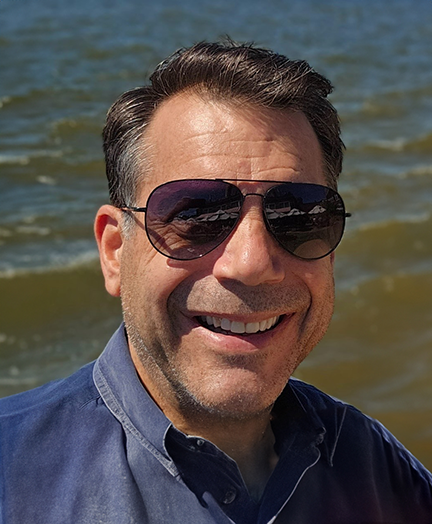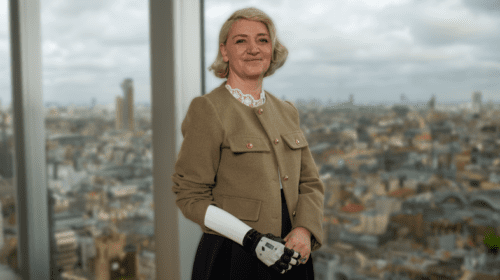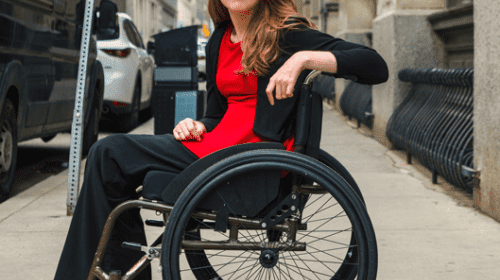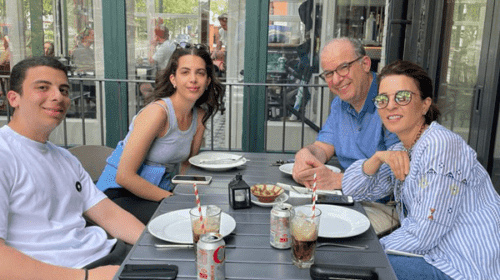Angela McKane: Hi, RK! Good to see you, and it is lovely to speak again!
Rob Kaimowitz: Hello! It is great to see you again, too!
AM: Thank you so much for agreeing to share some of your story with me today. Could we start right at the beginning – your early years?
RK: For sure. Well, I was born in New York City, on the Upper East Side, but I grew up in New Jersey. It was an upper middle-class neighborhood – with good schooling, and it was during high school that I discovered my true passions – skiing, and drumming! I was a drummer in the school bands and loved it– but I was a terrible student.
AM: Well, this all sounds very rock-n-roll to me so far, and makes me think of Dave Grohl.
RK: (Smiles) – It could have been. Instead, I went on to Syracuse University. I had to take a break after my freshman year and played in a band in my time off. I realized that I was just mediocre at the drums (relative to real pros) and went back and finished at Syracuse.
AM: Maybe it was your inner entrepreneur – you just wanted to get out there and do things?
RK: Yeah, I was poor at absorbing anything in the classroom. I found I learned much better by doing and I was entrepreneurial from a young age. I had a paper route from sixth grade right through to the end of high school so that I could pay for my own skiing and drum equipment and stay in shape because I delivered all those newspapers after school on my bicycle.
After I got my stuff together and went back to Syracuse, I talked my way into a new cool major which, at the time, was called Information & Computing Sciences. I learned to code databases and because of that was able to land a job coding in dBase3 right out of school. But, my heart wasn’t in it and honestly, I was fairly lost without a career direction until my early 30s when I discovered how to be a Wall Street analyst. I found I was really good at it being an analyst; so good, in fact, that I became the number one in the world at what I did, with stocks in commercial satellites and space. So, I built upon that and started my own hedge fund. I had a very successful Wall Street career for 15 years. I was at the top of my game – until I got sick. In 2011, I was diagnosed with chronic, untreated Lyme disease.
AM: Oh, sorry to hear this. Was it the onset of symptoms you first noticed?
RK: Actually, I had symptoms since I was a kid, but they were always strange symptoms that it was hard to explain. My eyes would sometimes feel painful and like they were bulging; it was so bad sometimes it felt like they could explode. I would also find it really hard to focus and I would get brain fog, but these symptoms would come and go, and it was difficult to draw a connection between them and make any sense of it.
However, once I was fully grown and had been running my own hedge fund successfully for some years, these symptoms started to reappear with a vengeance, and other symptoms, too. My hands started getting numb, so much so that I could no longer drum or even hold a drum stick. I couldn’t read a computer screen without getting vertigo. I had serious mood swings and was unable to regulate my emotions because the infection crosses the blood-brain barrier. I was under a lot of stress – of course, by 2008/9 there was the financial crash and I was running a large hedge fund. We’d have our morning meeting, and all the analysts would talk about the stocks they had and any changes since the previous day, and after five or six seconds in, I’d find myself drawing a blank as to which stock we were actually talking about. It was a high-performance environment and I started really blaming myself for this, really beating myself up that there must be something wrong with me as a person.
AM: That must have felt awful – and really compounded any stress.
RK: Yes, completely. There I was conducting a character assassination on myself when in time, my sister reached out to me. It turned out, she had been having very similar symptoms, and she had been referred to a doctor who specialized in tick-borne illnesses in New York City. My sister showed me a three-page checklist of potential symptoms and she said, “RK, you’ve had so many of these, and this has been going on your whole life since we were kids!” So, I went to see the doctor and after some tests and diagnostics, they confirmed I had been living with chronic undiagnosed Lyme disease – for decades. Both my sister and I had been at sleep away camp and we think we got bitten by ticks then.
AM: Whoa. Did this diagnosis feel like a shock?
RK: It sure did, and I was placed on antibiotics for three years to treat it…
AM: Three years!
RK: Oh, yeah – and a whole bunch of treatments to counter their side effects as well! It was a cocktail of antibiotics and I found they made me feel worse – much worse, actually; before, I felt better. I really spiraled. I felt so unwell and I lost everything. I felt that, because people had seen me at the top of my game they needed to keep seeing me there, at my best; otherwise, it was hard to keep them fully engaged with me. When I wasn’t as sharp as normal, it was really hard for my family to understand, especially as this would ebb and flow, and I would have really good days, and then really bad ones. But, of course, until the diagnosis, none of us really knew what was going on.
I entered the loop of self-blame again. I was depressed. I felt like I was really losing my abilities and my competitive edge. It was a huge fall from where I had been and I was being really harshly judged by some of the people I would have hoped I could have relied on. Physically, my symptoms actually did start to get better, but emotionally I hit rock bottom. That in itself caused even more confusion for those around me. How could it be that I seemed to be on the mend physically and yet continued to spiral emotionally? Even a psychologist turned to me and said that classic phrase, “But you don’t look sick!”
AM: So, is it fair to say that, regardless of how you looked, you were feeling terrible?
RK: Exactly. Emotionally, I really went as low as it is possible to go. That downward path started with the market implosion, and I do try to explain it to people as follows: When you are on Wall Street, your whole psyche is tied to how well your stock portfolio is doing. So much of your life is invested in it, that if the stock blows up, your life is blowing up, too. It sort of even feels contagious. Everyone on the trading floor, all your buddies and all your competitors, everyone’s psyche is tied up in the movements of the market! With the benefit of hindsight, I can confidently say that it’s really not healthy. Though I am happy to say that all of our investors got their money back and we outperformed the market all the way through. It was still an incredibly stressful time. We needed to be able to provide liquidity when they needed it.
AM: You must have felt that you were carrying a lot of responsibility for others on your shoulders.
RK: Yes. I had to keep writing checks just to keep the company afloat, keep people employed, keep making payroll. Looking back, I put my own (and my family’s) financial interest behind that of our clients, which was the right thing to do at the time. In the end, I fell on my sword for our investors. I ended up out of work and sick for around five years and, for me, it was really a process of emotional recovery. It took time. At first I was on the couch, incredibly depressed. When I say I lost everything, I do mean everything.
AM: I am so sorry to hear this.
RK: Thank you. You know one of the worst things was simply when people just didn’t believe me. I would try to explain how bad I was feeling, how I no longer could perform the way they expected of me, and the types of symptoms I was having. I felt that people would get frustrated with me as though I could control it. As though I was faking it! In fact, one person even said that I was “setting a bad example for my son.”
AM: Chronic illness is such a difficult thing, especially where the symptoms manifest as a mixture of things, which could apply to different diagnoses as well.
RK: Yes, and I think this is why, with something like Lyme disease, it is difficult to diagnose and could be easily misdiagnosed or missed entirely. I had all this other context, including the financial crash, and everything else going on around me at the same time as well. Thankfully, emotionally, I did start to turn things around.
AM: I’m glad. Could you share a little about what made that possible?
RK: Well, around the same time, I stumbled across an article the premise of which was about women who had taken 10 or even 20 years out of the workforce, often to have and look after children. The article described how some would follow a path back to work that involved reaching out to the same people they had been working with before they took time out. It sparked an idea in me: There were people out there who knew and would remember me from when I was doing well and that would be what they knew of me.
One of them was a guy I’d been friends with since the mid-90s and he is the CEO of a major satellite company. I called him up and explained what had happened. He flew me out to his company’s headquarters in California, I spent all day with members of his leadership team and built an understanding of a technical issue they were facing relevant to jet fuel usage in the airline sector. I built my first spreadsheet in six years that night and realized I could solve the issue. In that moment, my company, Nexteon Technologies, was born.
With this idea, I knew I was on to something, so I reached out to a guy who had been a strong competitor on Wall Street, and he wrote the first investor check into my new company. Now we are thriving and have various proprietary technologies that can enable more efficient, greener and more secure aviation. It feels fantastic to see what we have built and brought to market.
AM: Awesome! That shows he really respected you as a worthy competitor.
RK: When I reached out, that is exactly what I was hoping would be the case, and indeed it was. It’s funny the learnings from an experience like this. You find out who your real friends are, and where you’ve built trust that you can go back and build again from. Sometimes it’s with the very people that you didn’t always see eye to eye with!
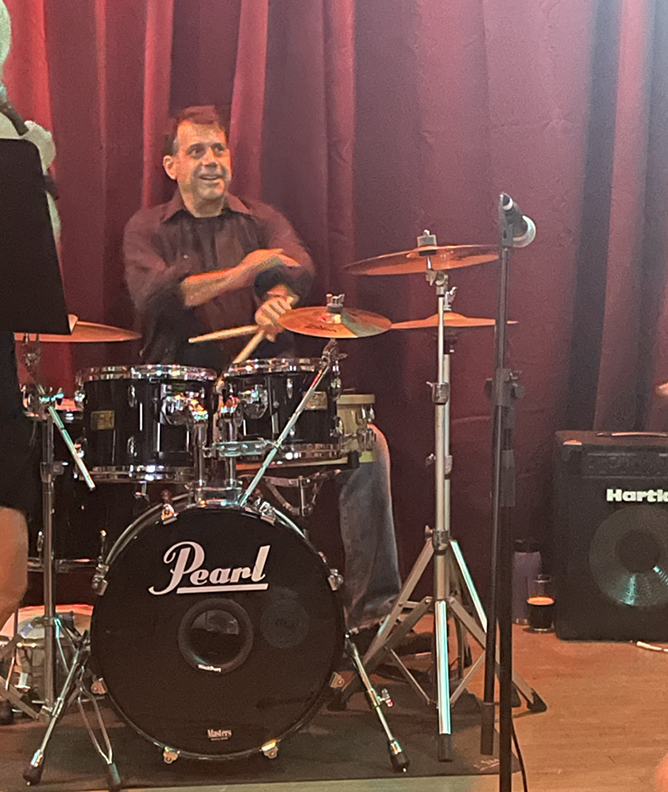
That put a spring in my step again and now I am really flourishing. The company is growing and landing new clients, and I am playing drums in the evenings again. The same guys from way back, we are playing again now – and you know, it is so cathartic, even if you do have a tough day at work or some other setback, there is nothing like letting it out onto the drums in the evening. It is a release!
AM: Ah, this is fantastic RK. Thank you so much for being so open with our readers. Is there one final message or take away that you would like to leave?
RK: Yes, my message would be to the friends, colleagues and family of anyone diagnosed with chronic Lyme or indeed any other chronic disease. Please know the symptoms are very real for them, and they need your support. In the case of something like Lyme disease, the infection can cross the blood-brain barrier and cause the brain to get inflamed. This can make it difficult to regulate one’s emotions and, in my case, I ended up having a complete breakdown.
There is another key message from that which I would like to leave, though. It is – even if you hit your absolute lowest ebb, even if you hit rock bottom and you lose everything, and you find yourself thinking you cannot go on, and perhaps you do not even want to go on – you can get back from there. It can take time, and that is not to understate just how hard it is, but it can be done. It is likely that your own inner critic is being even harsher on you than you’ll find others will be. When you’re ready, reach out to the people who knew you before. Hey, I even went back to Syracuse and finished my original degree in the end – 20 years after I had begun! It’s okay to find your own path and surprise people, to find your own beat on those drums.
AM: RK, on behalf of myself and our readers, if you have a video of you on the drums, we would love to see it! Thank you so much for sharing your story.
Headline photo: Rob Kaimowitz shown on the beach in Marin, California. Photos courtesy of Rob Kaimowitz.
Angela McKane works with early-stage startups focused on developing solutions across the defense, transport and energy sectors. Prior to this McKane was VP Technology Insights at bp, where she grew and led a global team for over a decade, delivering actionable insights on emerging technology innovations and investment opportunities to teams across the Group. Earlier in her career, McKane worked at Transport for London (“TfL”) and, prior to that, she worked at her alma mater, the University of Glasgow. McKane is a regular speaker at industry leading conferences including Gastech, CERAweek and more. Connect with McKane onLinkedIn.
Oil and gas operations are commonly found in remote locations far from company headquarters. Now, it's possible to monitor pump operations, collate and analyze seismic data, and track employees around the world from almost anywhere. Whether employees are in the office or in the field, the internet and related applications enable a greater multidirectional flow of information – and control – than ever before.



